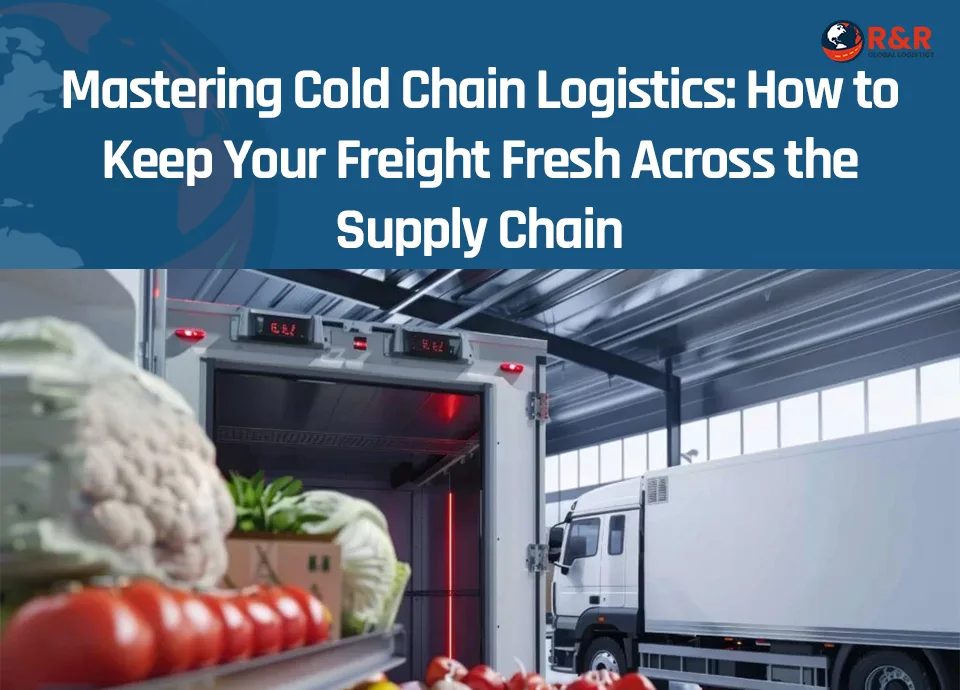Transporting temperature-sensitive freight—such as fresh produce, dairy, frozen food, or pharmaceuticals—is no easy task. It requires precision, advanced infrastructure, and an unbroken cold chain from origin to destination. As demand for safe, high-quality perishables grows globally, cold chain logistics has become more critical than ever.
At R&R Global Logistics, we specialize in temperature-controlled freight solutions that ensure your goods arrive safely, on time, and compliant with all regulatory standards. In this article, we’ll explore the essentials of cold chain logistics, the challenges involved, and how we help shippers stay ahead of the curve.
What Is Cold Chain Logistics?
Cold chain logistics refers to the process of transporting and storing products under temperature-controlled conditions. It’s used primarily for:
- Perishable food (produce, dairy, meat, seafood, frozen goods)
- Pharmaceuticals and vaccines
- Floral products
- Chemicals and biotechnology
The goal is to maintain product quality, safety, and shelf life by keeping cargo within strict temperature ranges from the point of origin to the final destination.
Why Cold Chain Matters More Than Ever
Consumer demand for fresh, minimally processed food is on the rise. At the same time, global distribution networks are expanding, creating longer transit times and more touchpoints. This increases the risk of temperature excursions that can lead to:
- Product spoilage
- Regulatory non-compliance
- Financial losses
- Damage to brand reputation
An effective cold chain is not just a convenience—it’s a necessity for shippers operating in food, healthcare, and agriculture industries.
Key Components of a Cold Chain
A successful cold chain system requires a blend of physical infrastructure, technology, and operational excellence. Here’s what it involves:
1. Refrigerated Transport
Whether it’s a refrigerated truck, reefer container, or air freight with temperature control, specialized vehicles are the backbone of cold chain logistics.
2. Cold Storage Facilities
Before and after transport, products must be kept in temperature-regulated warehouses to prevent exposure during handling and staging.
3. Temperature Monitoring Technology
Modern cold chain logistics employs real-time sensors and GPS tracking to ensure visibility and immediate response to temperature deviations.
4. Strict Compliance and Documentation
Standards from the FDA, FSMA, and other regulatory bodies require detailed records, sanitation protocols, and quality assurance at every step.
Common Cold Chain Logistics Challenges
Cold chain shipping isn’t without its complications. Shippers often face:
- Inconsistent infrastructure across different regions or countries
- Last-mile vulnerabilities during final delivery to rural or urban destinations
- Power outages or reefer malfunctions that cause spoilage
- Complex regulatory environments, especially for cross-border shipments
- Seasonal surges (like produce season or holiday demand) that strain capacity
Without a dependable logistics partner, even one weak link in the chain can cause catastrophic losses.
How R&R Global Logistics Delivers Cold Chain Excellence
At R&R Global Logistics, we provide cold chain solutions tailored to your freight type, temperature requirements, and delivery timelines. Here’s how we make it seamless:
✅ Nationwide Refrigerated Capacity
We’ve built a network of vetted reefer carriers and equipment providers across the U.S. to scale with your needs—whether you’re shipping locally or coast to coast.
✅ FSMA & FDA Compliance
Our team ensures your freight complies with all FSMA Sanitary Transport rules and industry-specific regulations. We document handling processes to support traceability and safety.
✅ End-to-End Temperature Monitoring
We deploy smart sensors that provide real-time temperature visibility, alerts, and digital logs—giving you peace of mind that your cargo is in safe hands.
✅ Surge-Ready Support
Whether you’re moving berries from California in June or turkeys in November, our team ramps up capacity and routes to keep you on schedule.
✅ Customized Handling & Packaging
We work with shippers to optimize packaging, pallet configuration, and loading strategies to prevent spoilage and maximize airflow.
Industries We Serve with Cold Chain Expertise
- Food & Beverage: From farm to shelf, we ensure perishables are fresh, intact, and compliant.
- Pharmaceuticals: Sensitive cargo like vaccines and insulin require strict cold chain integrity.
- Agriculture: Seasonal produce and flowers often face tight delivery windows and quality thresholds.
- Grocery & Retail: We manage store-ready shipments and direct-to-distribution center deliveries.
Cold Chain Best Practices for Shippers
To maintain cold chain integrity, shippers should:
- Know your cargo’s temperature requirements (e.g., frozen vs. chilled).
- Use pre-cooled trailers to avoid thermal shock during loading.
- Avoid unnecessary delays—time outside the cold chain is risky.
- Partner with logistics experts who understand the complexities of temperature-controlled transport.
- Monitor and log temperatures throughout the journey for traceability and QA audits.
Final Thoughts: Don’t Let the Cold Chain Break
Maintaining a secure cold chain isn’t just about having the right trucks—it requires precision planning, experienced logistics teams, and the right technology. At R&R Global Logistics, we help our clients move perishable goods safely and efficiently, without the headaches.
Let us handle your cold chain logistics so you can focus on growing your business.
📩 Ready to Ship Temperature-Sensitive Freight?
Contact our cold chain logistics specialists today for a free consultation and quote.
→ Request a Quote


1 Comment